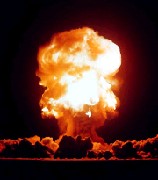|
Boten Anna posted:Also it makes sense that for a coal plant you could just not burn as much coal, but this isn't the case for nuclear energy and it seems like that would be where pumping water uphill to burn off excess generation, etc. would be more common.
|
|
|
|

|
| # ? May 24, 2024 18:41 |
|
Boten Anna posted:Interesting, though I imagine there are inefficiencies to ramping up/down/turning off power plants, and there's an optimal level of output that is the most efficient, much like how the Volt works, and similar to the Volt, if there were battery arrays everywhere that could store excess generation so that the power plant runs at constant peak efficiency it would be a boon. Also it makes sense that for a coal plant you could just not burn as much coal, but this isn't the case for nuclear energy and it seems like that would be where pumping water uphill to burn off excess generation, etc. would be more common. You can burn less uranium if need be, but it's less important since fuel is such a small part of the cost and impact of a nuclear power plant. Probably the best environmental use of batteries is going to be as a way to replace spinning reserves with juice stored up from a strong wind or solar farms. Then we can get rid of burning fuel and not getting any actual power out of it. edit: Also for most systems the most efficient generation level is going to be as close to max all the time you can manage. Of course this never happens, but sine the cost and pollution of the plants construction is factored in over the lifetime of the plant, it's best to keep 'em running. This is one of the reasons why peakers are expensive. Killer-of-Lawyers fucked around with this message at 18:07 on May 5, 2015 |
|
|
|
Boten Anna posted:Also it makes sense that for a coal plant you could just not burn as much coal, but this isn't the case for nuclear energy Um...it absolutely is. Nuclear plants aren't particularly easy to shut off and then restart right away due to xenon-135 hanging around for a while inhibiting the reaction, but it can be done if you have enough reactivity control in your design, but nuclear reactors can certainly reduce the reaction rate to reduce output power. It's pretty fundamental to operating reactors.
|
|
|
|
Phanatic posted:Um...it absolutely is. Nuclear plants aren't particularly easy to shut off and then restart right away due to xenon-135 hanging around for a while inhibiting the reaction, but it can be done if you have enough reactivity control in your design, but nuclear reactors can certainly reduce the reaction rate to reduce output power. It's pretty fundamental to operating reactors. Yup. Usually you control power output through water flow rate. Increase flow rate, decrease temperature, increase water density, increase reaction rate, increase power. But when you scram or otherwise shut down a nuclear reactor it is a goddamn headache to get it back and running. You have about 30 minutes to get it back up, or else you're waiting days for the xenon/samarium poisoning to fade (short lived fission products that gobble up neutrons and kill reactivity. They're factored into normal operation, but when you shutdown they can dominate reaction equations and prevent chain reaction from taking place, killing startup). The high efficiency and consistency of nuclear power is one of the reasons it makes such a good baseload source. I think it has the highest capacity factor of all power sources, since most plants can run continuously except for only a couple weeks every 2 years.
|
|
|
|
Pander posted:Yup. Usually you control power output through water flow rate. Increase flow rate, decrease temperature, increase water density, increase reaction rate, increase power. With Thorium plants, you can harvest the stable Helium and Xenon after a few days and sell it. It also produces Krypton, which requires a longer storage time for decay than Helium and Xenon. Not to mention the lack of downtime due to the fuel being a liquid and can just be filtered out while in use. They also produce Beryllium, which is toxic. And there is the issue of filtering out Noble Metals, which build up in the pipes containing the fuel.
|
|
|
|
Yeah, there's a lot of issues with liquid thorium reactors. I don't really think we'll ever see them for a while. There's too much inertia behind solid fuel systems in the industry. Which is fine, a solid fuel thorium reactor would still be nice.Pander posted:Yup. Usually you control power output through water flow rate. Increase flow rate, decrease temperature, increase water density, increase reaction rate, increase power. Yeah, nukes are fantastic base load, but being able to throttle up and down is becoming more and more important for them as renewable sources like wind come online. They're nice though because fuel is such a small insignificant part of their operating costs, so they still make fantastic baseload sources. Capacity factors can be a bit weird. A lot of factors come to play in it, and the capacity factor for nuclear in the US has shot up dramatically over the last 20 years or so. We've probably gotten better at being efficient about refueling, and there's probably been more and more work put into keeping them running at max capacity. The fact that Natural gas is popular might have a lot to do with it. It's really easy to turn down those during the night, and just let the nuclear backbone run at near max capacity 24/7. There's also a lot of economic incentive to run at 100% all the time, as the cost of the plant is factored over the amount of power it produces in its lifetime, and the cost of building the plant in the first place is where the real cost of nuclear is.
|
|
|
|
CommieGIR posted:
It's toxic in dust form, where you don't want to breathe it. This is not a serious reason to not do LFTRs; the fluoride is also toxic, for that matter.
|
|
|
|
It should probably be noted that the era of nuclear reactors being particularly difficult to throttle up or down, or run at partial power, is well behind us. The complex interplay of power grids in central Europe has ensured that France has paid a lot of attention to this issue, and they've gotten pretty good at it.
|
|
|
|
Yes. Modern reactors can throttle by 50% in less than an hour already, the issue is with the old leftover reactors.
|
|
|
|
Of which there are a lot, because the lifespan of a reactor is looooooong.
|
|
|
|
Well the average age of a reactor in France is 24, while the average age of a reactor in the US is 30. The difference is mainly that French reactors are given the political space and funding to engage in responsible upgrades and best practices. Again, it's more of a political issue than a question of engineering. http://www.statista.com/statistics/272142/average-age-of-nuclear-reactors-in-selected-countries/
|
|
|
|
Phanatic posted:It's toxic in dust form, where you don't want to breathe it. This is not a serious reason to not do LFTRs; the fluoride is also toxic, for that matter. I wasn't saying that it didn't make it worth it. I was just stating a fact. Not for or against it.
|
|
|
|
blowfish posted:Yes. Modern reactors can throttle by 50% in less than an hour already, the issue is with the old leftover reactors. Quoting from earlier in the thread: http://www.oecd-nea.org/ndd/reports/2011/load-following-npp.pdf quote:Modern nuclear plants with light water reactors are designed to have strong manoeuvring capabilities. Nuclear power plants in France and in Germany operate in load-following mode, i.e. they participate in the primary and secondary frequency control and some units follow a variable load programme with one or two large power changes per day.
|
|
|
|
Boten Anna posted:Interesting, though I imagine there are inefficiencies to ramping up/down/turning off power plants, and there's an optimal level of output that is the most efficient, much like how the Volt works, and similar to the Volt, if there were battery arrays everywhere that could store excess generation so that the power plant runs at constant peak efficiency it would be a boon. Also it makes sense that for a coal plant you could just not burn as much coal, but this isn't the case for nuclear energy and it seems like that would be where pumping water uphill to burn off excess generation, etc. would be more common. Yes - in most cases, the most efficient operation comes from running at full load. The exceptions are where the station can do something different in order to eke a few more MW out at times of high prices. Examples of this are burning oil on top of the coal, in order to generate more power at a higher cost, where the limiting factor is the amount of coal that can be milled and fed into the boiler; or ducted firing on a combined cycle gas plant, where more gas is burned downstream of the gas turbine, to put more energy into generating steam in the HRSG if that station's steam turbine is capable of taking more steam than the exhaust from gas turbine can produce. The easiest way to think about it (and to model it, for that matter) is to imagine a fixed amount of fuel the station is burning when it's on load, that doesn't produce any useful power output. Each additional MW of power then takes a fairly constant increase in fuel burn. This means that you get an efficiency curve that looks something like this: (note that the values are just numbers I've pulled out of thin air, but model a 49.13% efficient 450 MW CCGT) 
|
|
|
|
Sounds like the optimal solution is a large nuclear plant designed to mostly run at full capacity plus a smaller more nimble plant designed for quick variability. Unless there's no additional costs to just build a single large plant that can rapidly change its output while maintaining decent efficiency.
|
|
|
|
Thanks for the detailed responses, everyone. I'm learning a lot! Speaking of affordable battery arrays, does anyone know where we are on supercapacitors? I haven't heard much about them lately, and I'm just waiting for the other shoe to drop to find out what horrible drawbacks they have or that they're definitely not feasible Baronjutter posted:Sounds like the optimal solution is a large nuclear plant designed to mostly run at full capacity plus a smaller more nimble plant designed for quick variability. Unless there's no additional costs to just build a single large plant that can rapidly change its output while maintaining decent efficiency. I'm to understand that's basically how it works, backbone plants generate base load with expensive but vital peak generators for times of high demand. The reason a looming massive drop in the cost of battery arrays are prompting a discussion on how power stations handle load is that it will have huge positive effects on the grid, such as being able to operate plants at peak efficiency instead of reactively to current demand, massively reducing the need for expensive generators and all but eliminating brownouts.
|
|
|
|
RDevz posted:What I've had in the past is a maintenance/start-up charge from the station for incurring an additional startup, and if the price of power overnight is sufficiently low that you can make back the startup cost in terms of avoided negative dark spread capture, you turn it off overnight. I get most of the rest of the jargon, and I can guess what this is, but could you explain negative dark spread capture? ohgodwhat fucked around with this message at 03:42 on May 7, 2015 |
|
|
|
I'll believe all this battery tech when it's deployed and proven its self technically and economically and not just a bunch marketing hype.
|
|
|
|
Baronjutter posted:I'll believe all this battery tech when it's deployed and proven its self technically and economically and not just a bunch marketing hype. Well, Ars posted:http://arstechnica.com/business/2015/05/tesla-already-has-38000-reservations-for-the-powerwall-but-use-case-is-narrow/ If it can cost more than it saves and doesn't blow up within the warranty period it will have proven to do what Musk claims it does. It's doable. Bates fucked around with this message at 18:41 on May 7, 2015 |
|
|
|
ohgodwhat posted:I get most of the rest of the jargon, and I can guess what this is, but could you explain negative dark spread capture? Dark spread is the difference between the cost of generation for a coal power station, and the price of power. A positive dark spread means that you make money from running and selling the power generated. A negative dark spread means that, were the station to generate at that point in time, it'd lose money from doing so. Negative dark spread capture is a shorthand for "a coal station which is running at a loss due to low power prices". Spark spread is the analogous term used for gas generation. Occasionally we try to work out what the terms for oil and nuclear are, but none of the suggestions catch on. Boten Anna posted:I'm to understand that's basically how it works, backbone plants generate base load with expensive but vital peak generators for times of high demand. The reason a looming massive drop in the cost of battery arrays are prompting a discussion on how power stations handle load is that it will have huge positive effects on the grid, such as being able to operate plants at peak efficiency instead of reactively to current demand, massively reducing the need for expensive generators and all but eliminating brownouts. You end up displacing expensive peaking plant with slightly less expensive batteries. Either way, you're going to have to build some means of generating which is only called upon at times of dire need, and is last in the merit order of plant running. This ends up not running much across the year, but still needs to make back its construction costs. It's therefore phenomenally expensive to run, regardless of whether it's an inefficient open cycle gas turbine, or some means of storing energy in an efficient and convenient manner. Excess capacity is expensive on a per-MWh basis, but is needed to make sure the grid doesn't collapse. RDevz fucked around with this message at 14:39 on May 7, 2015 |
|
|
|
RDevz posted:Dark spread is the difference between the cost of generation for a coal power station, and the price of power. A positive dark spread means that you make money from running and selling the power generated. A negative dark spread means that, were the station to generate at that point in time, it'd lose money from doing so. Negative dark spread capture is a shorthand for "a coal station which is running at a loss due to low power prices". Nukes pretty clearly ought to be "quark spread."
|
|
|
|
Oil can be Jurassic Park Spread.
|
|
|
|
I googled "dark spread capture" and got some surprising results!
|
|
|
|
Kalman posted:Nukes pretty clearly ought to be "quark spread." baryon spread would be more appropriate
|
|
|
|
Biomass generation should be "bark spread".
|
|
|
|
QuarkJets posted:baryon spread would be more appropriate Wouldn't rhyme with the others, though.
|
|
|
|
Kalman posted:Wouldn't rhyme with the others, though. Hmm I was going to say that quark doesn't really rhyme with dark, either, but now I think that we were actually pronouncing it wrong at CERN all along. I and everyone I ever worked with there pronounced it closer to how "quork" would sound (rhyming with stork). But given the spelling, I do think it makes more sense for it to rhyme with "dark" and "spark". "Quork" definitely sounds better so it's not like I'm going to change my pronouncing of it, but it's interesting to think about. Anyway, you're totally right
|
|
|
|
Ivanpah can be flaming lark spread. Tidal can be shark spread.
|
|
|
|
Pander posted:Ivanpah can be flaming lark spread. Tidal can be shark spread. Thorium is liquid gold spread?
|
|
|
|
QuarkJets posted:Hmm I was going to say that quark doesn't really rhyme with dark, either, but now I think that we were actually pronouncing it wrong at CERN all along. I and everyone I ever worked with there pronounced it closer to how "quork" would sound (rhyming with stork). But given the spelling, I do think it makes more sense for it to rhyme with "dark" and "spark". "Quork" is the weirdest loving pronunciation I've ever heard. I take my pronunciation guide from only the finest Armin Shimmerman characters.
|
|
|
|
OwlFancier posted:"Quork" is the weirdest loving pronunciation I've ever heard. I take my pronunciation guide from only the finest Armin Shimmerman characters. "Quork" is how it's pronounced in physics, but Armin Shimmerman is awesome and I'm totally ok with it.
|
|
|
|
What's the origin on the word and very non-intuitive pronunciation? I know some people that work in a print shop that say cyan "ky-an" instead of "sy-an" and now I don't know what's right anymore.
|
|
|
|
Baronjutter posted:What's the origin on the word and very non-intuitive pronunciation? cyan = sigh-anne. quark = kworck
|
|
|
|
Baronjutter posted:What's the origin on the word and very non-intuitive pronunciation? http://en.wikipedia.org/wiki/Quark#Etymology
|
|
|
|
Baronjutter posted:What's the origin on the word and very non-intuitive pronunciation? Murray Gell-Mann: "In 1963, when I assigned the name "quark" to the fundamental constituents of the nucleon, I had the sound first, without the spelling, which could have been "kwork". Then, in one of my occasional perusals of Finnegans Wake, by James Joyce, I came across the word "quark" in the phrase "Three quarks for Muster Mark". Since "quark" (meaning, for one thing, the cry of the gull) was clearly intended to rhyme with "Mark", as well as "bark" and other such words, I had to find an excuse to pronounce it as "kwork". But the book represents the dream of a publican named Humphrey Chimpden Earwicker. Words in the text are typically drawn from several sources at once, like the "portmanteau" words in "Through the Looking-Glass". From time to time, phrases occur in the book that are partially determined by calls for drinks at the bar. I argued, therefore, that perhaps one of the multiple sources of the cry "Three quarks for Muster Mark" might be "Three quarts for Mister Mark", in which case the pronunciation "kwork" would not be totally unjustified. In any case, the number three fitted perfectly the way quarks occur in nature."
|
|
|
|
Baronjutter posted:What's the origin on the word and very non-intuitive pronunciation? German, of course. If it sounds like a real word then it's always French.
|
|
|
|
Phanatic posted:Murray Gell-Mann: "In 1963, when I assigned the name "quark" to the fundamental constituents of the nucleon, I had the sound first, without the spelling, which could have been "kwork". Then, in one of my occasional perusals of Finnegans Wake, by James Joyce, I came across the word "quark" in the phrase "Three quarks for Muster Mark". Since "quark" (meaning, for one thing, the cry of the gull) was clearly intended to rhyme with "Mark", as well as "bark" and other such words, I had to find an excuse to pronounce it as "kwork". But the book represents the dream of a publican named Humphrey Chimpden Earwicker. Words in the text are typically drawn from several sources at once, like the "portmanteau" words in "Through the Looking-Glass". From time to time, phrases occur in the book that are partially determined by calls for drinks at the bar. I argued, therefore, that perhaps one of the multiple sources of the cry "Three quarks for Muster Mark" might be "Three quarts for Mister Mark", in which case the pronunciation "kwork" would not be totally unjustified. In any case, the number three fitted perfectly the way quarks occur in nature." Yeah... I'm going to keep saying it the correct Armin Shimmerman way.
|
|
|
|
I have never heard it pronounced as kwark, only kwork. So if you decide to pronounce it as kwark, do so knowing that you aren't using the colloquial pronunciation, the professional pronunciation, or the intended pronunciation
|
|
|
|
QuarkJets posted:I have never heard it pronounced as kwark, only kwork. So if you decide to pronounce it as kwark, do so knowing that you aren't using the colloquial pronunciation, the professional pronunciation, or the intended pronunciation No one cares, KwarkJets.
|
|
|
|

|
| # ? May 24, 2024 18:41 |
|
Kalman posted:No one cares, KwarkJets. That's right, and I least of all
|
|
|

















 I CANNOT EJACULATE WITHOUT SEEING NATIVE AMERICANS BRUTALISED!
I CANNOT EJACULATE WITHOUT SEEING NATIVE AMERICANS BRUTALISED!







